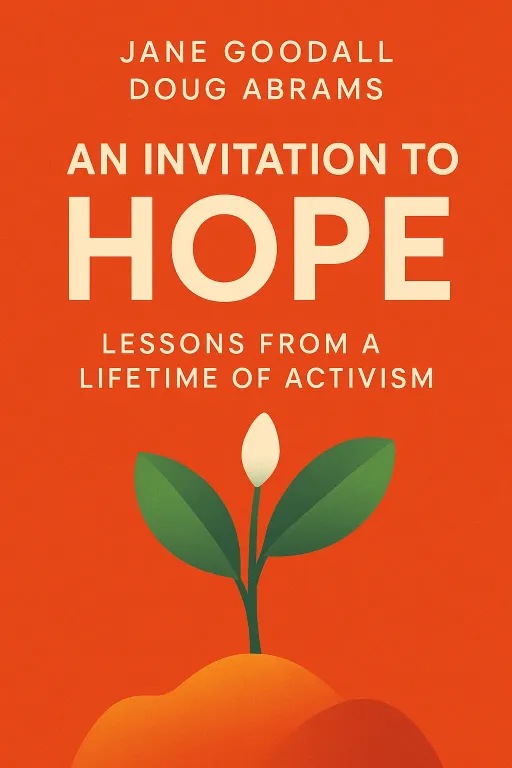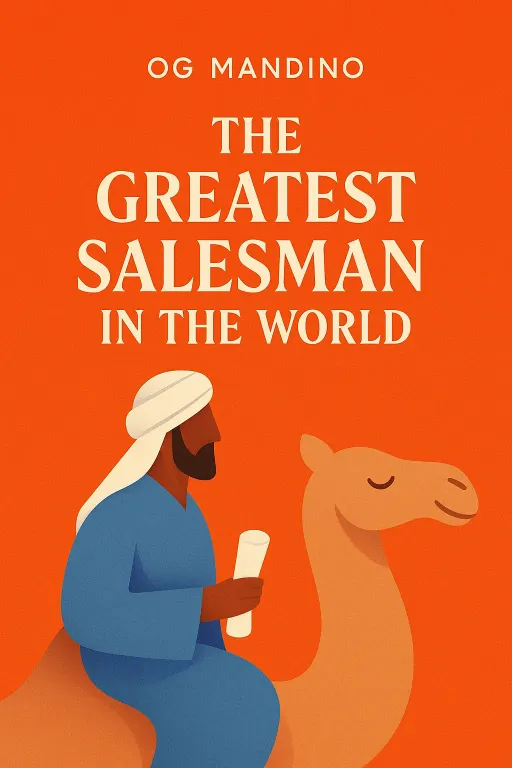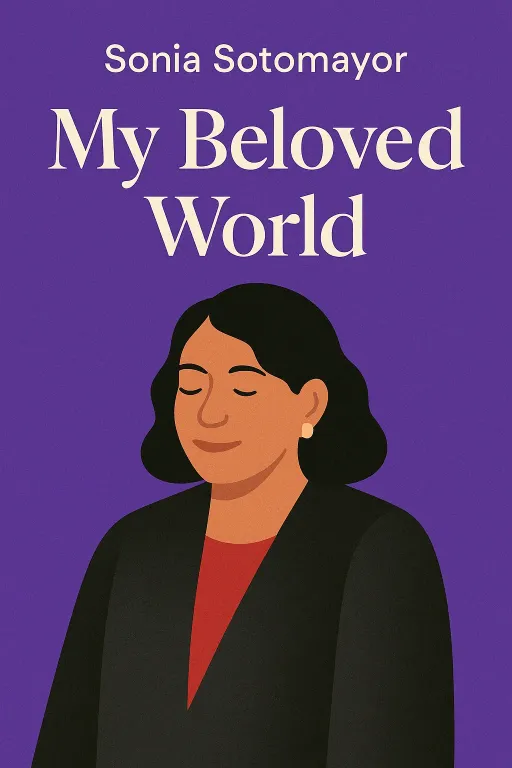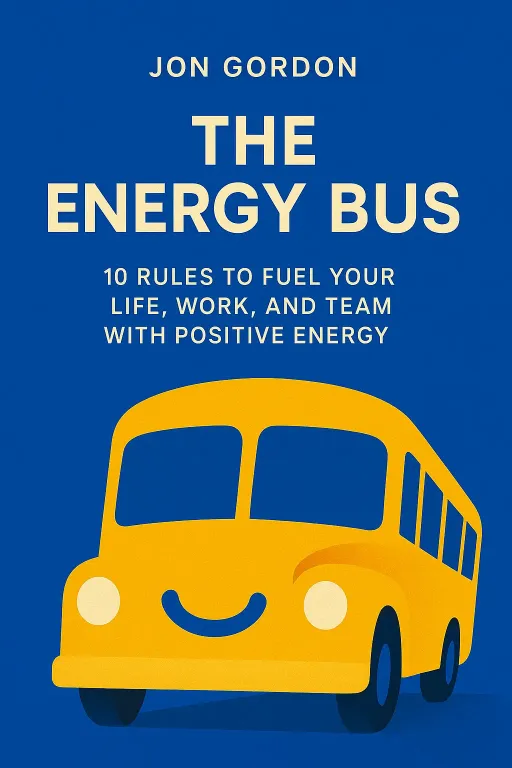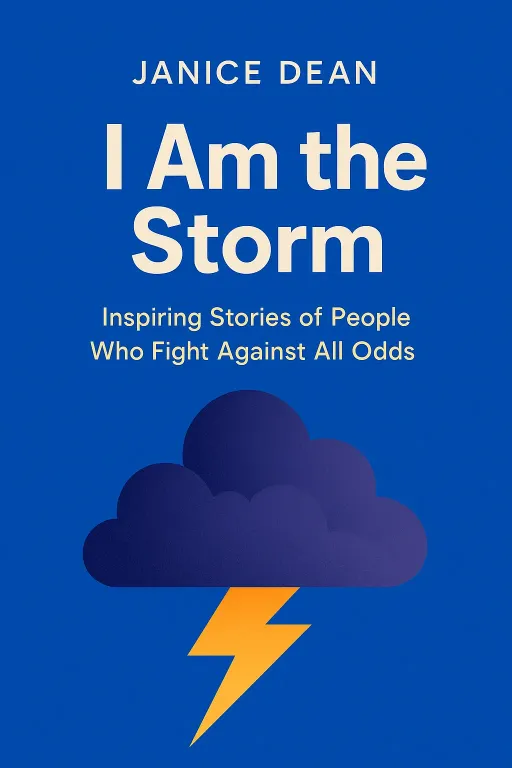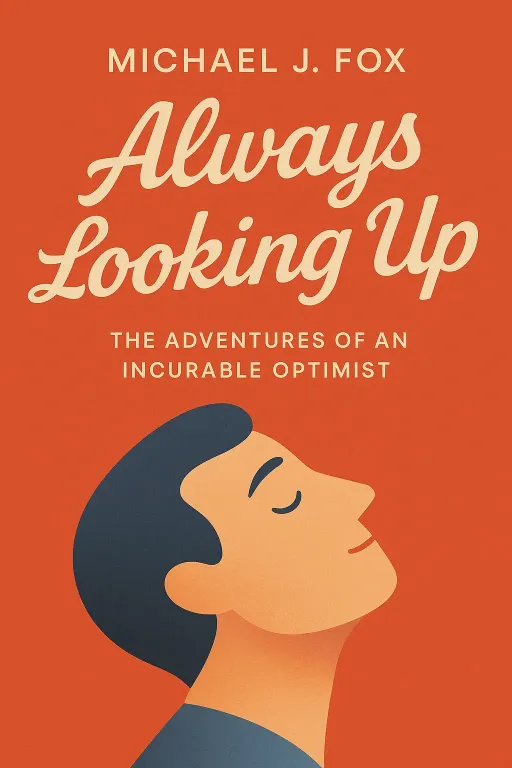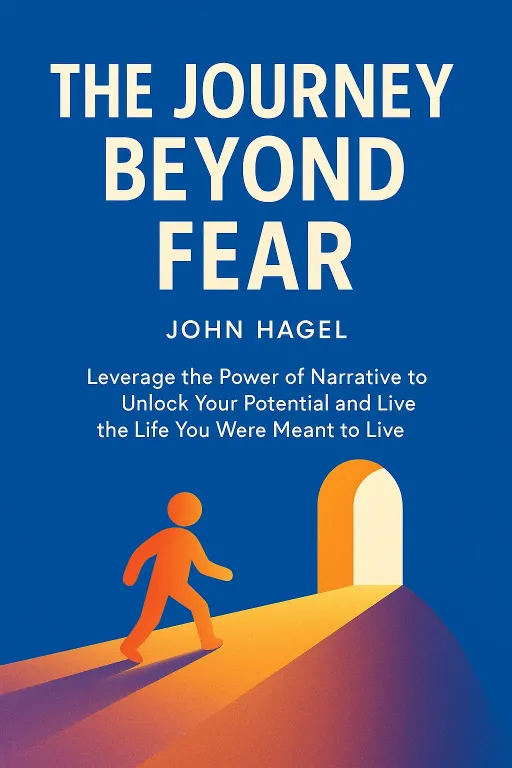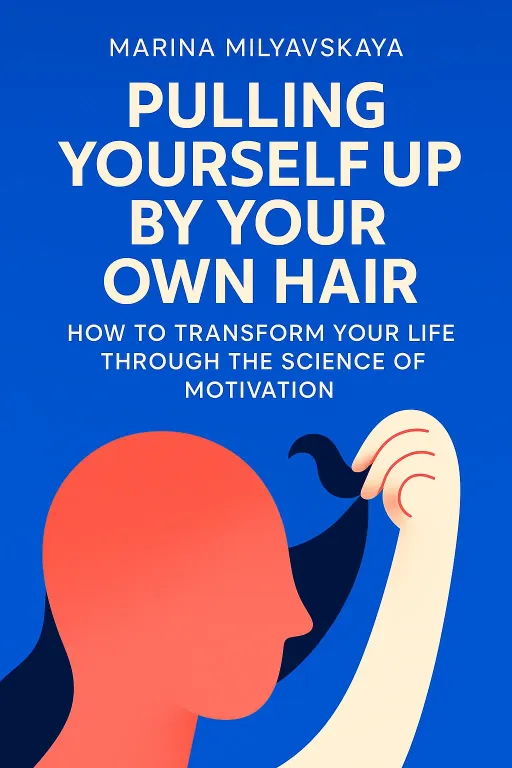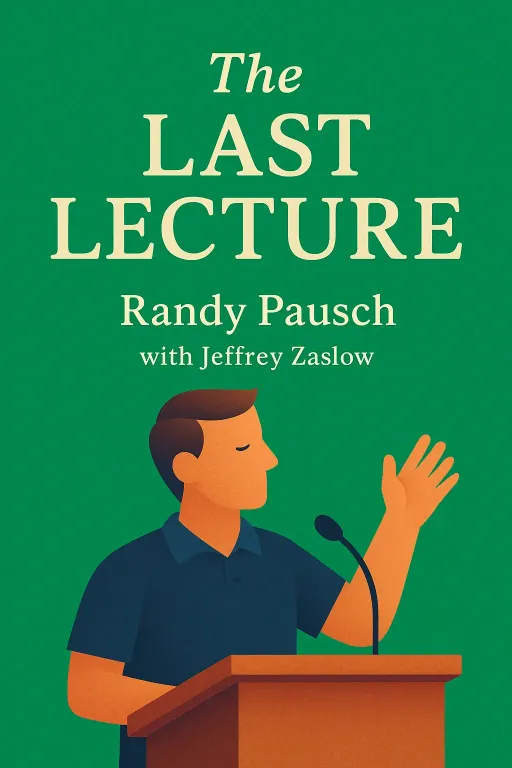
The Power of the Head Fake
11 minGolden Hook & Introduction
SECTION
Mark: Alright, Michelle, I'm going to be honest. When I hear 'follow your dreams,' my eyes glaze over. It feels like a coffee mug slogan. But this book argues that's dangerous advice. The real goal isn't the dream at all—it's something else entirely. Michelle: Exactly! And that's the paradox at the heart of The Last Lecture by Randy Pausch. What makes this book so powerful is its origin story. This wasn't just a self-help author's theory; it was a literal last lecture from a Carnegie Mellon professor who had just been given a few months to live with terminal pancreatic cancer. Mark: Wow, so the stakes couldn't be higher. Michelle: Right. And the lecture he gave, "Really Achieving Your Childhood Dreams," became this massive viral phenomenon online. It was viewed by millions because it was so raw, so funny, and so incredibly wise. He’s standing there, showing slides of the tumors on his liver, and then he drops and does a set of one-handed push-ups. Mark: That’s one way to get an audience's attention. But if the lecture isn't actually about achieving your dreams, what is it about? That feels like a bait-and-switch. Michelle: It is! But it’s the most brilliant and compassionate bait-and-switch you’ll ever encounter. Pausch calls it a "head fake."
The Head Fake: Achieving Dreams by Living Right
SECTION
Mark: A 'head fake'? Okay, you have to explain that. It sounds like a basketball move. Michelle: It's a perfect analogy. In sports, a head fake is when you look one way to make your opponent think you're going in that direction, but you actually go the other way. Pausch says that's how the best learning happens. We think we're learning one thing, but we're actually learning something much deeper. Mark: I think I need an example. Michelle: He gives a fantastic one from his childhood. He joined a youth football league at age nine, and his coach was this old-school, no-nonsense guy named Jim Graham. Coach Graham never let them touch a football for the first few weeks of practice. Mark: What? That’s like signing up for a cooking class and only washing dishes for a month. Michelle: Precisely. The kids were furious. All they did were conditioning drills and stances. Over and over. Coach Graham would walk around, correcting every little detail. He’d grab a kid by the hips and physically move him into the right position, yelling, "Where his belly button goes, his body goes!" It was all about the fundamentals. Mark: That sounds miserable. I would have quit. Michelle: Many probably wanted to. But here’s the head fake: the kids thought they were there to learn how to play football. But Coach Graham was teaching them something far more important: perseverance, discipline, and how to take criticism. He was building character. Mark: Ah, so the football was just the excuse to teach the life lesson. Michelle: Exactly. And Pausch shares this incredible piece of wisdom he learned from that experience. Coach Graham was toughest on him, always correcting him, always pushing him. One day, an assistant coach pulled Randy aside and said, "You know, when you’re screwing up and nobody says anything to you anymore, that means they’ve given up on you." Mark: Whoa. That hits hard. It completely reframes what criticism means. It’s not an attack; it's a sign that someone still believes you can be better. Michelle: It’s a sign of investment. And that’s the core of the head fake. You pursue a goal—a dream—and the process of pursuing it teaches you everything you need to know about life. This brings us to another one of Pausch's most famous ideas: the concept of "brick walls." Mark: Okay, I’m listening. This sounds more substantial than a coffee mug. Michelle: Pausch says that brick walls are everywhere in life. They're the obstacles, the rejections, the moments you want to give up. But he has a unique perspective on them. He says, "The brick walls are there for a reason. They’re not there to keep us out. The brick walls are there to give us a chance to show how badly we want something." Mark: That’s a powerful reframe. So the wall isn't a stop sign, it's a test. Michelle: It’s a filter. It stops the people who don't want it badly enough. And his own life is the perfect case study. One of his biggest childhood dreams was to become a Disney Imagineer. He was obsessed. He even painted an elevator door on his bedroom wall as a kid. Mark: A true fan. So he gets his PhD in computer science and applies, right? Michelle: He does. He's at the top of his field, a brilliant professor. He sends his application to Walt Disney Imagineering and gets back a polite, but firm, rejection letter. A huge brick wall. Mark: Ouch. That’s got to sting. So what does he do? Michelle: He doesn't try to knock the wall down. He doesn't send angry letters. He just keeps working, keeps building his skills. Years later, as a professor, he becomes a pioneer in virtual reality. He hears that Disney is working on a new VR attraction based on Aladdin. Mark: And now he has something they need. Michelle: Exactly. He found a back door. He persistently contacted the head of the project, a guy named Jon Snoddy. He didn't just ask for a job; he showed up prepared. He had studied their work, he knew the field inside and out. He was so impressive that Snoddy offered him a six-month sabbatical position to work on the project. He walked right through that brick wall. Mark: That’s an amazing story. But I have to push back a little. That's great for a genius professor at Carnegie Mellon. What about a regular person? Some brick walls are just... walls. You can't get through them. Michelle: That’s a fair point, and Pausch addresses it. The point isn't necessarily that you will always break through every wall. The value is in the effort. The process of trying to get over, under, or around that wall teaches you about yourself. It clarifies what you're truly passionate about. Maybe you discover that what you thought you wanted wasn't the real dream after all. The struggle itself is the head fake. Mark: So even in failure, you're learning the real lesson. You’re building the skills and character that you'll need for whatever comes next. Michelle: Precisely. And that realization—that the journey is more important than the destination—is what leads to the second, and arguably more profound, part of his philosophy.
Enabling the Dreams of Others: The Ultimate Fulfillment
SECTION
Michelle: And that's the perfect pivot, because Pausch discovered that achieving his own dream, like working at Disney, wasn't the ultimate goal. The real fulfillment came from something else entirely: becoming a 'brick wall remover' for others. Mark: A brick wall remover. I like that. It’s a shift from focusing on yourself to focusing on others. Michelle: It's a profound shift. He realized that being a teacher, a mentor, gave him the chance to do something even better than achieving his own dreams: he could enable the dreams of others. And there's no better story to illustrate this than the one he tells about "Training a Jedi." Mark: I am all ears for anything involving the word 'Jedi.' Michelle: In the early 90s, he had a student at the University of Virginia named Tommy Burnett. Tommy was a brilliant, ambitious kid, and he told Randy that his ultimate childhood dream was to work on the Star Wars movies. Mark: A classic nerd dream. I can relate. But at that time, there were no new Star Wars movies being made. The original trilogy was long over. Michelle: A seemingly impossible dream. A huge brick wall. But Randy didn't dismiss it. He hired Tommy onto his research team and, in his own words, pushed him hard. He set incredibly high expectations. He was that tough-love Coach Graham figure for Tommy. Over the next few years, Tommy became an exceptional programmer, mastering complex systems and skills. Mark: He was unknowingly preparing for an opportunity that didn't even exist yet. Michelle: Exactly. Then, George Lucas announces he's making the Star Wars prequels. Industrial Light & Magic, the special effects powerhouse, starts hiring. And who do you think they needed? They needed programmers with the exact, high-level skills that Tommy had spent years developing in Randy's lab. Mark: No way. Michelle: Yes. Tommy applied and got the job. He achieved his impossible childhood dream. He went on to work on all three prequel films. Randy says that seeing Tommy succeed, knowing he had a hand in it, was more fulfilling than any personal achievement, including his time at Disney. Mark: Wow, that's... that's actually really moving. It reframes mentorship completely. It’s not just giving advice or making a phone call. It’s about seeing a spark in someone and then rigorously, intentionally helping them build the toolkit they'll need to be ready when luck—or the Force—strikes. Michelle: And Pausch didn't just do this one-on-one. He built systems to do it at scale. He co-created the Entertainment Technology Center at Carnegie Mellon, a master's program that brought artists and engineers together to build virtual worlds. It became a dream-fulfillment factory, placing hundreds of students at top companies like Pixar, EA, and, yes, Disney. Mark: So he went from being a dream-achiever to a dream-enabler. He became the person who provides the back doors through the brick walls. Michelle: He became the ultimate head fake coach. He created a course where students thought they were just making cool video games, but they were actually learning how to collaborate, innovate, and lead. He even helped develop a free software called Alice, which teaches kids programming through storytelling. It’s been downloaded by millions. That’s his legacy. Mark: It’s incredible. The whole book is a legacy, really. A message in a bottle for his kids. But the ripple effect of his work, of enabling so many other people's dreams... that's a legacy for the world. Michelle: And it all comes from that one core idea: that enabling the dreams of others is the most selfish thing you can do, in the best possible way, because the fulfillment you get back is immeasurable.
Synthesis & Takeaways
SECTION
Mark: So the journey is a spiral. You start by chasing your own dreams, which is a 'head fake' to teach you how to live with integrity and perseverance. You learn how to deal with brick walls. Then, you use those lessons to help others navigate their own brick walls, which turns out to be the real point all along. Michelle: That’s a perfect summary. You live your life in a way that makes you capable, and then you use that capability to lift others up. And Pausch has this one quote that ties it all together, the final, powerful head fake he reveals at the very end of his lecture. Mark: What is it? Michelle: He puts a slide up on the screen and says, "It’s not about how to achieve your dreams. It’s about how to lead your life." Then he continues, "If you lead your life the right way, the karma will take care of itself. The dreams will come to you." Mark: That’s a beautiful thought. It takes all the pressure off. You don't have to obsess over the outcome. You just have to focus on living with purpose and integrity. Michelle: But then he delivers the final, emotional gut-punch. He reveals the second head fake. He clicks to the last slide, which is a picture of his three young children, and he says that the entire lecture, all the stories, all the lessons... "It was for my kids." Mark: Oh, man. That gives me chills. The whole thing was a message for them. A guide for how to live, from a father who knew he wouldn't be there to teach them himself. Michelle: It’s a legacy of love, disguised as a lecture on computer science and childhood dreams. And it’s why the book, despite some critics finding it sentimental, has had such a lasting impact. It’s authentic. Mark: It really is. It makes you think... what 'head fakes' are you currently in? What are you really learning while you're chasing that promotion or that degree or that personal goal? Michelle: That's the question to sit with. We'd love to hear from our listeners about this. Share your own "brick wall" stories or "head fake" moments with us on our social channels. What did you learn when you thought you were learning something else? Mark: It’s a powerful idea to carry with you. Live right, and the dreams will come. Michelle: This is Aibrary, signing off.
